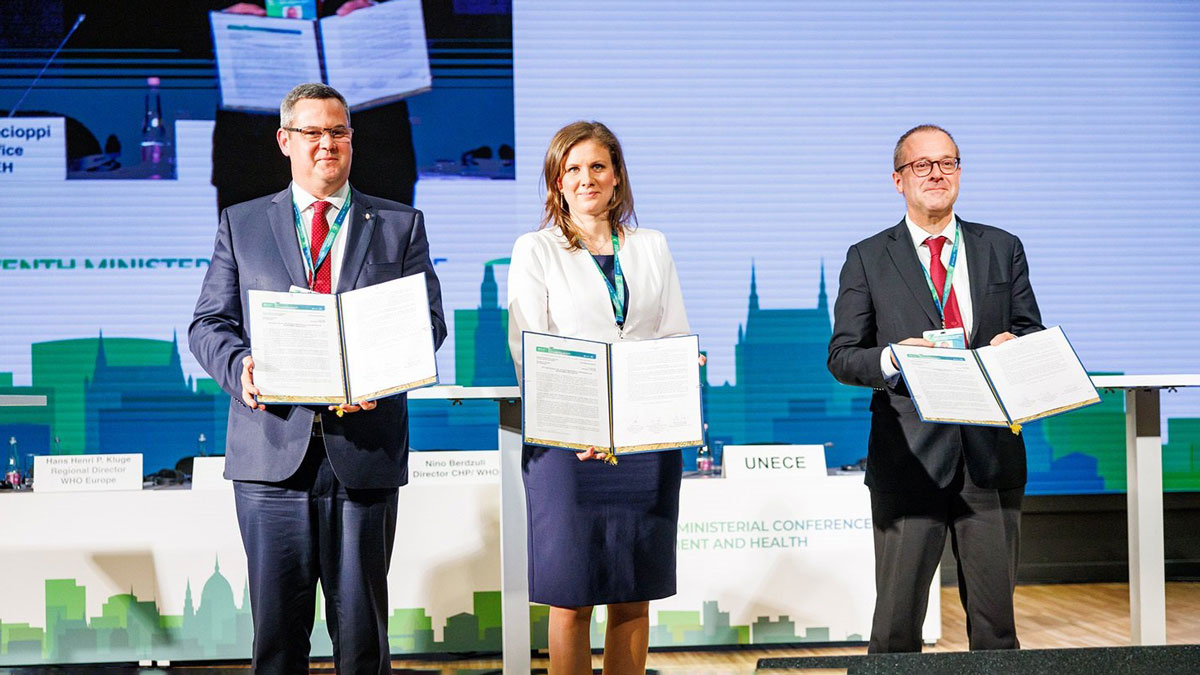Pushing Action to Enhance Environment and Health
Budapest Declaration
Countries of the WHO European Region, which gathered at the 7th Ministerial Conference on Environment and Health (7MCEH) in Hungary, have adopted the Budapest Declaration, which prioritizes urgent, wide-ranging action on health challenges related to climate change, environmental pollution, biodiversity loss and land degradation, along with, and in the context of, recovery from COVID-19. To strengthen countries’ capacities to fulfill commitments made under the Declaration, it also focuses on strengthening governance, investing in human resources, and advancing knowledge and tools for action.
“We are close to the breaking point with the climate crisis and its devastating impact on health and well-being in our Region and globally – exacerbated by other multiple, overlapping health emergencies at this time of permacrisis. But with teamwork, expertise, and political will, we have a solid chance – through the Budapest Declaration and the commitments it contains – to tackle this existential threat. We must walk, indeed run, together on the road ahead – a journey that will be far from easy, but one that we should have embarked on a long time ago,” said Dr Hans Henri P. Kluge, WHO Regional Director for Europe.
In the Declaration, countries agree to accelerate the transition towards resilient, healthy, equitable and sustainable societies, incorporating the lessons learned from the COVID-19 pandemic. They seek to increase efforts to prevent, prepare, detect, and respond to emergencies, protecting particularly vulnerable populations. These actions aim to enhance health systems’ resilience and capacity to withstand and respond to disasters and crises. In addition, efforts to address the environmental determinants of diseases will increase.
Countries will use the “Roadmap for healthier people, a thriving planet and a sustainable future 2023–2030”, which is part of this Declaration, to expedite the transitions needed to bring about sustainable communities. This Roadmap offers a set of actions Member States can implement to reduce the health consequences posed by climate change, environmental pollution, and biodiversity loss. It also proposes steps to strengthen governance, human resources, financing and knowledge for health and the environment. The roadmap explains why urgent action is needed in a particular area, offers a list of commitments countries can consider, and suggests measures to achieve them.
The Declaration also offers countries the possibility to launch European Environment and Health Process (EHP) Partnerships, a new mechanism within the EHP, to help accelerate the implementation of the vision and commitments made at the Ministerial Conference. The Partnerships bring together countries and partners with a shared interest in a specific thematic area to work together on joint projects, capacity-building activities, training and workshops, the provision of technical assistance, collaboration in innovation and research, and the dissemination of relevant WHO guidelines.
Not least, the Budapest Declaration incorporates the voices and concerns of young persons, who were strongly represented at the 7MCEH, high on the agenda, and whose blueprint for climate and health action was folded into the wider deliberations.
“It’s no exaggeration to say that the Budapest Declaration and the steps it lays out are a landmark achievement; one that comes not a moment too soon,” said Dr Kluge. “We must ensure now that we maintain the momentum coming out of the 7MCEH, hold ourselves accountable, and live up to the promises made to the youth of our Region in the months and years to come.”



